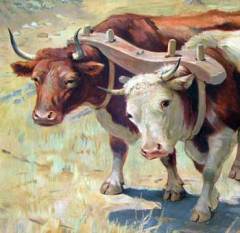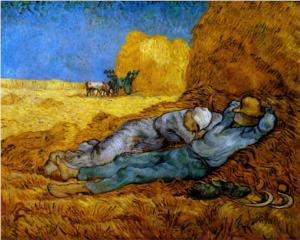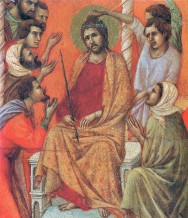Good, Better, and Best: A Meal with Martha, Mary, and Jesus
Luke 10:38-42
38 As Jesus and his disciples were on their way, he came to a village where a woman named Martha opened her home to him. 39 She had a sister called Mary, who sat at the Lord’s feet listening to what he said. 40 But Martha was distracted by all the preparations that had to be made. She came to him and asked, “Lord, don’t you care that my sister has left me to do the work by myself ? Tell her to help me!” 41 “Martha, Martha,” the Lord answered, “you are worried and upset about many things, 42 but only one thing is needed. Mary has chosen what is better, and it will not be taken away from her.”
————-
Usually when we hear about Mary and Martha, we hear human-centered moralisms that exhort us to be more like Mary, because it says Mary chose the wiser. But that misses the more transcendent point. Ultimately, this text isn’t really about Mary or Martha, but is instead mostly about Jesus: The most overlooked aspect of this text is the astonishing fact that God himself is WITH them there in their home. The creator and sustainer of the entire universe (Col 1:15-20) is sitting in their humble Bethany home WITH Mary and Martha; and enjoying their company no less. Astounding!
In this devotional, we will take a look at these three main characters: The good (Martha), the better (Mary), and the best (Jesus).
1. The GOOD: Martha
Martha typically gets a bad rap in this story as an overly-anxious worker bee, but Jesus doesn’t admonish her for her service. He’s not angry or critical at all; in fact, his tone is quite empathetic and his emphasis focuses on the internal anyway.
So to roll up our sleeves, put on an apron, unlock a homeless shelter or soup kitchen door, or grab a Bible and to get to work for Christ is not a bad thing at all. Of course not. On the contrary, each of us is an integral part of the spiritual body of Christ (1 Cor 12), and we are each given spiritual gifts at the point of our regeneration (Eph 2:10) for the building up of and service to the community, in Christ’s name. It’s our calling as Christians.
It’s not that Martha chose a bad thing, it’s that she just didn’t choose the better thing; the better option available at the time. Instead she became annoyed and resentful about her sister Mary who was sitting at the feet of Jesus.
2. The BETTER: Mary
Mary adored Jesus from the depths of her soul. She had much to be thankful for because she had much which was forgiven.
Case in point: Let’s rewind a few chapters in the gospel of Luke. Back in chapter 7, there is a different account about another meal where once again Martha was serving (especially noted in John 12:2) and Mary* was at Jesus’ feet. And in this earlier text, Mary the ex-prostitute (“woman who lived a sinful life” 7:37), is seen pouring out her alabaster jar of expensive perfume, mixing it with the sobbing tears of repentant joy, and figuratively anointing Jesus for (future) burial. That she would even be allowed to worship Jesus in that extravagant way, in the presence of men, in the home of a Pharisee (one who made decisions based on clean and unclean; staying AWAY from religiously unclean people), and using the tainted perfume a prostitute uses to mask the odors of her male customers is nothing short of amazing; an unabashed exhibit of new life.
And now to return to our meal in Bethany (ch.10), the biographer Dr. Luke describes that Mary was sitting “at the Lord’s feet listening to what he said” (vs.39 logos = λόγος). Let’s stop for a moment and make it clear that Mary isn’t merely sitting and looking up at Jesus’ face all doe-eyed while he smiled on. No! Jesus was talking, it says. As per usual, he was always teaching about himself; the Kingdom of God, and here was Mary listening, learning, and worshiping.
There are some who would say that “being” with Jesus means just to sit blankly and meditate quietly and while there is certainly the place for that type of contemplative prayer, this is NOT what’s going on here in our story. Instead, Mary is listening intently to Jesus’ Words.
We who also follow Christ would do well, when we sit prayerfully with Him (either in group or individual worship settings), to have the focal point also be his words; the Word of God: The scriptures of both the Old and New Testaments which all testify to Jesus; from beginning to end: To talk less and listen more.**
Any more about this story, we just don’t know. We aren’t privy to the behind the scenes about whether Mary ever helped serve or whether the sisters took turns serving and listening; the gospels don’t tell us. But what they do tell us is that God himself, Jesus Christ, was in their home, in their midst, enjoying their company. Wow!
3. The BEST: Jesus
The simplistic and moralistic message of “Mary chose better… go and do likewise” completely misses the opulent and vital theme of grace. This story, and all of the Bible, is really not about them, you, me, or us at all. It’s all about HIM.
The takeaway of this narrative is that we have a Lord who adores his people so much that he was willing to leave his comforts and throne (as well as his pre-existing intimacy with his Father) and let all those things go (for a time) in order to draw Mary, Martha, you, and me into that similar sweet place of intimacy with himself. That is a life-changing notion.
The most important lesson to learn from this narrative is that the God of the universe loved his people so deeply that at a historic place and time, he became a man and was (and is) content to sit in our midst and enjoy our company as we worship him with our repentance, thankfulness, and attentiveness.
Our Lord Jesus is worthy of all our sincere service and our worshipful adoration.
~Wade
———————–
From the gospel reading for July 29th, “The Feast of Mary and Martha of Bethany”.
*Not all commentators agree that the “sinful woman” in chapter 7 is the Mary of Bethany of chapter 10. To me, there are enough clues across all the gospels to make that significant connection. The John 12 account that has Martha again serving is one piece of strong evidence. The Luke 8:1-2 passage following immediately on the heels of Lk 7 which starts off “after that” (though not necessarily immediate and chronological) and lists Mary continuing as traveling companion in Jesus’ entourage is another piece. Ultimately, I like to stay close to the text and let the text speak. With this issue, I’m playing analytic detective a bit.
**Martha was the more vocal sister (seen also in the death of Lazarus narrative in John 11) and wanted Jesus to listen to HER words where Mary was the more quiet sister and listened to HIS words instead. Today, in our devotional lives, we often give God our complaints and requests far more than we let his Word (the scriptures of both the OT and NT) speak powerfully into our minds and hearts. There should be a balance.
***vs.40 “help me”, the Greek συναντιλαμβάνομαι is only used one other time in the NT. In Romans 8:26 “In the same way the Spirit also helps our weakness ; for we do not know how to pray as we should, but the Spirit Himself intercedes for us with groanings too deep for words ”. Interesting and spiritually uplifting to ponder the connection between Martha’s request for help and the Holy Spirit’s intercessory help in our time of weakness and need.







